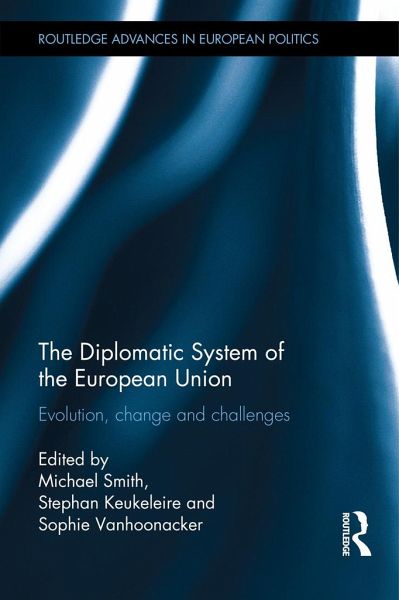
The Diplomatic System of the European Union
Evolution, change and challenges
Herausgeber: Smith, Michael; Vanhoonacker, Sophie; Keukeleire, Stephan
Versandkostenfrei!
Versandfertig in 1-2 Wochen
187,99 €
inkl. MwSt.

PAYBACK Punkte
94 °P sammeln!
This book provides an investigation of the diplomatic system of the EU, embracing commercial policy and foreign and security policy, within the broader study of diplomacy and of the European integration project. It is structured around the interrelated themes of institutional change and the evolving practices of EU diplomacy - the latter in the two key areas of strategic diplomacy, exemplified by EU relations with the BRIC countries, and structural diplomacy, exemplified by EU involvement with the problems of Kosovo and the Congo. The contributors analyze and evaluate the development of the EU's system of diplomacy, with particular reference to the implementation of the Lisbon Treaty, the establishment of the European External Action Service (EEAS) and the emerging practices of EU diplomacy. Bringing together leading academic experts to produce an original approach to the development and operation of the EU's diplomatic system this book makes an important contribution to academic and policy debate on the EU's diplomacy. It will be of wide interest to those studying the international relations of the EU, European Union politics, international relations and diplomacy.
Over the past five years, the EU has established a new system of diplomacy centred on the European External Action Service (EEAS) and the High Representative for Foreign Affairs and Security Policy. This new system reflects a process of evolution in a changing context, and has been faced by major challenges since its inception. This book examines the diplomatic system of the EU, locating it within the broader study of diplomacy and the European integration project. The volume is structured around the interrelated themes of institutional change and the evolving practices of EU diplomacy. It tracks the development of the EU's system of diplomacy, with particular reference to the implementation of the Lisbon Treaty, the establishment of the EEAS and the emerging practices of EU strategic and structural diplomacy. Bringing together contributions from leading experts in the field, this book provides an original approach to the development and operation of the EU's diplomatic system. This book will be of interest to students and scholars of European Union international relations, European Union politics and diplomacy.














